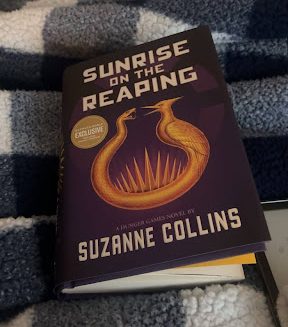“This woman only writes when she has things to say,” writes Clance on Goodreads in her review for “Sunrise on the Reaping,” the latest installment of the critically and widely acclaimed “Hunger Games” saga.
“This woman” is author Suzanne Collins, and she has been the true Gamemaker since 2008 in her novels “The Hunger Games,” “Catching Fire” and “Mockingjay” as well as their subsequent movie adaptations. She shocked the world in 2020 with her release of a prequel entitled “The Ballad of Songbirds and Snakes,” which got its own movie adaptation in 2023.
In an entertainment landscape now chock full of prequels and sequels Collins was throwing a risky hand. Especially writing a story from the perspective of President Snow, the central villain to the entire original trilogy, Collins had a lot to lose.
It is safe to say that, given the book’s performance in bookstores, online rating sites as well as the movie’s overall grossing of over $100 million in its first week, Collins didn’t lose a thing. Instead, she proved herself separate from the prequel and sequel craze in her appreciation and respect for her own previous works and the purposeful intentions she had behind the novel.
In her latest installment, “Sunrise on the Reaping,” she proved herself yet again.
Set in the fiftieth Hunger Games—the second Quarter Quell—readers are given the perspective of Haymitch, one of the most mysterious, heartbreakingly frustrating and beloved characters in the original trilogy. The audience gets his experience as a 16-year-old boy from District 12 thrown into the deadliest and most unapologetic match by Collins yet.
The first noticeable aspect about this novel was how upfront and honest Collins was being. This novel relies heavily on the theme of propaganda and exploiting the less wealthy to benefit the rich. Collins does not beat around the bush. She states outright that the Capital is creating propaganda to feed to their citizens, and so are the rebels in the later trilogy. With her use of George Orwell’s quote “All propaganda is lies, even when one is telling the truth” as the opener to this entire novel, it was hard not to notice. Given the state of today’s world, the bluntness and rawness at which she presented this.
Additionally, this novel was so much more violent and gritty than Collins’ previous books. She does not hold back on her descriptions of the violent death these children experience in the arena, nor the dark and depressing thoughts that run through Haymitch’s mind throughout this novel’s entirety. Again, this was appreciated, as it was a new flavor from this world of Panem, which seems to be a flavor many authors and production companies can’t seem to taste.
This leads to the final noticeable aspect of this novel. Every single sentence, cameo, setting and song in this novel was absolutely on purpose. Collins did not throw beloved characters from this series into this novel without reason in order to get a few extra million sales. Instead, she weaved together ideas that readers thought they understood with even deeper ones, letting us get to know these characters more intimately and heartbreakingly than ever before.
She answers questions “Hunger Games” fans have had for years and connects them both to “The Ballad of Songbirds and Snakes” and the original trilogy, deepening the entire universe. It creates an itch to reread the entirety of this saga to try and catch more details or seemingly throwaway lines of dialogue. This novel embodied everything anyone could ever want from a prequel – a more well-rounded picture, rather than what feels like a quickly thought out cash grab.
Overall, this novel was absolutely fantastic. It only makes the movie adaptation that will be premiering late next year, as well as whatever Collins has to say next, that much more exciting.



